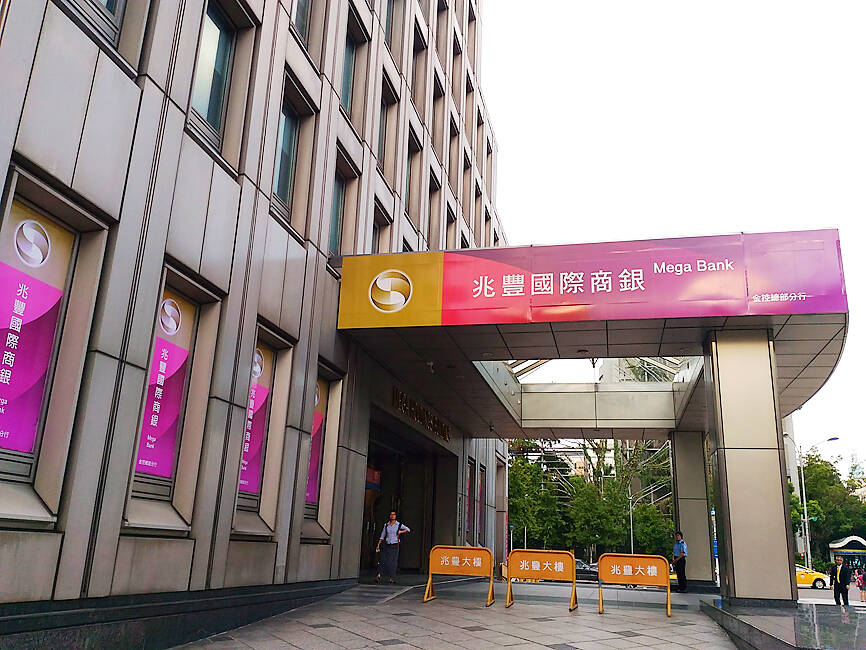State-run Mega Financial Holding Co (兆豐金控) yesterday said it is not expecting loan growth this year, but would seek profit improvement by adjusting its loan structure to avoid credit risks amid economic uncertainty at home and abroad.
The bank-focused conglomerate announced its approach after net income last year declined 29 percent annually to NT$18.34 billion (US$600.07 million), dragged by COVID-19 insurance claims at its non-life insurance arm Chung Kuo Insurance Co (兆豐產險). The results translated into earnings per share of NT$1.32.
“We will cautiously deal with loans that will likely stay flat this year,” Mega Financial Holding president David Hu (胡光華) told an online investors’ conference.

Photo: Lee Chin-hui, Taipei Times
The group aims to boost profitability by focusing on loan structure adjustments and operations that generate better yields, as fears build over financial stability in the US and Europe.
Mega Financial said it has no exposure to troubled Silicon Valley Bank and First Republic Bank in the US, or Credit Suisse Group AG’s Additional Tier 1 (AT1) debt that would be wiped out under a merger deal with UBS Group AG.
However, Mega Financial Holding does own Credit Suisse debt that has higher priority for payment, the company said.
To bolster its risk control, Mega Financial Holding has cut purchases of bail-in bonds, raised thresholds for bond investments and closely follows lending with tech start-ups, it said.
Nevertheless, North America has grown into the largest profit driver among overseas and offshore banking operations with a 60 percent share and would continue to carry heavy weight, thanks to strong demand for US dollars and interest rate hikes, Hu said.
Although the US Federal Reserve is slowing monetary tightening, interest rates would remain high in light of stubborn inflation, which is favorable for currency swap operations that generated sizeable profit last year, the company said.
Furthermore, main subsidiary Mega International Commercial Bank (兆豐銀行) would add to its operations in Southeast Asia, where Taiwanese firms have increased their presence in the past few years amid a global supply chain realignment, it said.
In retail banking, Mega Bank would expand digital accounts among young people and gain high-net-worth clients, the company said, adding that the lender ranks in the top three in Taiwan by number of affluent clients.
Mega Bank has no intention of adding to home loans this year and would limit operations mostly to first-home buyers and people with real demand, as property transactions are set to fall, it said.
Mega Financial Holding has not yet discussed its dividend policy, but it would not differ much from last year, Hu said.
Its retained earnings and reserves are more than NT$100 billion, allowing it to issue a decent cash dividend despite unrealized losses of NT$15.33 billion, company data showed.

The US dollar was trading at NT$29.7 at 10am today on the Taipei Foreign Exchange, as the New Taiwan dollar gained NT$1.364 from the previous close last week. The NT dollar continued to rise today, after surging 3.07 percent on Friday. After opening at NT$30.91, the NT dollar gained more than NT$1 in just 15 minutes, briefly passing the NT$30 mark. Before the US Department of the Treasury's semi-annual currency report came out, expectations that the NT dollar would keep rising were already building. The NT dollar on Friday closed at NT$31.064, up by NT$0.953 — a 3.07 percent single-day gain. Today,

‘SHORT TERM’: The local currency would likely remain strong in the near term, driven by anticipated US trade pressure, capital inflows and expectations of a US Fed rate cut The US dollar is expected to fall below NT$30 in the near term, as traders anticipate increased pressure from Washington for Taiwan to allow the New Taiwan dollar to appreciate, Cathay United Bank (國泰世華銀行) chief economist Lin Chi-chao (林啟超) said. Following a sharp drop in the greenback against the NT dollar on Friday, Lin told the Central News Agency that the local currency is likely to remain strong in the short term, driven in part by market psychology surrounding anticipated US policy pressure. On Friday, the US dollar fell NT$0.953, or 3.07 percent, closing at NT$31.064 — its lowest level since Jan.

Hong Kong authorities ramped up sales of the local dollar as the greenback’s slide threatened the foreign-exchange peg. The Hong Kong Monetary Authority (HKMA) sold a record HK$60.5 billion (US$7.8 billion) of the city’s currency, according to an alert sent on its Bloomberg page yesterday in Asia, after it tested the upper end of its trading band. That added to the HK$56.1 billion of sales versus the greenback since Friday. The rapid intervention signals efforts from the city’s authorities to limit the local currency’s moves within its HK$7.75 to HK$7.85 per US dollar trading band. Heavy sales of the local dollar by

The Financial Supervisory Commission (FSC) yesterday met with some of the nation’s largest insurance companies as a skyrocketing New Taiwan dollar piles pressure on their hundreds of billions of dollars in US bond investments. The commission has asked some life insurance firms, among the biggest Asian holders of US debt, to discuss how the rapidly strengthening NT dollar has impacted their operations, people familiar with the matter said. The meeting took place as the NT dollar jumped as much as 5 percent yesterday, its biggest intraday gain in more than three decades. The local currency surged as exporters rushed to